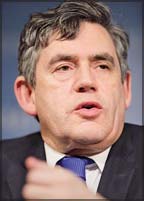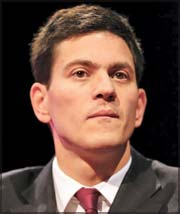Why not international probe on UK in Iraq?
 How often in recent weeks have you heard demands for transparency
being made from Sri Lanka by the West - transparency is the key word
being used in the current game of Sri Lanka bashing that is going on,
whether it comes from the ranks of British Cabinet Ministers or officers
of the United Nations. How often in recent weeks have you heard demands for transparency
being made from Sri Lanka by the West - transparency is the key word
being used in the current game of Sri Lanka bashing that is going on,
whether it comes from the ranks of British Cabinet Ministers or officers
of the United Nations.
But in the recent announcement by UK Prime Minister Gordon Brown of
an inquiry into what caused the UK to invade Iraq, its conduct of the
war against the people of Iraq and its consequences, there is pretty
little to show that Brown and his losing string of Labour hacks have any
regard in transparency.
For all the international involvement of the UK in the war in Iraq,
Gordon Brown only offers an internal probe; and that too in private. The
British public that lost more than 140 troops, and the Iraqis who lost
more than 1.5 million people, will be kept largely in the dark about UK
in Iraq as would the world community, quite unlike the demands being
heaped on Sri Lanka.
Our own people
The problem in Sri Lanka is one that involves its own people. Sri
Lankan troops did not go to any foreign country, uninvited by the people
of that land, to carry out regime change there. They did not do so under
the guise of hunting for hidden Weapons of Mass Destruction or WMD.
|

Prime Minister Gordon Brown |

David Miliband |
The country’s troops were not deployed in the North and East, having
misled Parliament on the purpose of their mission. In fact, the
Parliament of Sri Lanka, has freely voted to extend the State of
Emergency that facilitated the conduct of the military operations
against terror, once a month, every month.
It was an internal matter that did not see any foreign forces, except
when Indian troops came here with the consent of Colombo, and left at
the request of Colombo too, having lost nearly 1,800 of their numbers
and injury to many more.
Sri Lanka purchased its own weapons from a variety of sources, but
certainly not from the West, that did not want to provide us with
weapons to fight terrorism, although they were engaged in a War Against
Terror, in far off lands, that have as a result been torn apart into
sectarian violence, and new spirals of violence threatening the very
survival of some once stable nations.
Sri Lanka fought terrorism the hard way, in the face of a
multiplicity of obstacles placed by countries that have their own idea
of who or what a terrorist is, and how such forces that are dangerous to
society should be eliminated.
The recent observation by a Pakistani General leading the operations
against the Taliban in the Swat Valley that the leader of the Taliban
there should be eliminated, did not raise the ire of anyone in the West.
The General said exactly what he thought was necessary in the battle
against a terrorist organization spreading mayhem in his own country. It
is no different to what Sri Lankan military leaders said earlier about
the need to finally rout the LTTE and eliminate its leaders.
But many in the West still have the gumption to raise questions as to
how the fighting cadres of the LTTE, and its leader who masterminded so
much or savagery, was eliminated and the cycle of terror in this country
brought to an end. There are many voices rooted in the West that still
demand independent and international inquiries into the last days of the
LTTE’s rout.
Probe UK in Iraq
The facts of the UK’s involvement in the invasion of Iraq, it would
show there is every reason to call for a fully independent and
international probe into why the UK went to Iraq, what it did there and
what it has left the Iraqi people with.
The reasons are compelling. They went to a foreign land. They went
there uninvited by its people. They went under false pretexts, having
lied to their own legislature, the House of Commons, that Saddam Hussein
was on the verge of acquiring WMD.
They spun and twisted intelligence reports to mislead their own
legislature, and even worse, together with those in Washington who
misled both Houses of Congress about Iraq and WMD, also misled the UN
Security Council on the same matter.
They fooled the UN into endorsing the invasion of Iraq, which was in
fact an illegal and criminal act. The entire invasion was a war crime of
the highest order. All the bloodshed there was a humanitarian
catastrophe - bloodbaths aplenty that no one in the UN warned about. But
what do we have instead.
Gordon Brown, David Miliband and the other pathetic caricatures of
true Labour politicians, eating off the hands of a so-called Tamil
Diaspora that promises them vote banks and plenty of undeclared stuffed
brown paper envelopes, have announced a probe into the UK’s
participation in the war against Iraq, to be held in private.
An international atrocity of such magnitude is to be probed in
private, without even the media present to report what happens, at least
to the British people, if not the world. Such is the level of
transparency practised by those who demand the very extremes of public
disclosure from us.
Green introspection
We have heard much in recent months of attempts at reforms within the
UNP, with the calls for change coming after each election defeat, and
similar calls for the stepping down of the UNP’s leader who guided the
party to this plight. The leader seems quite cozy and the members who
shout also appear not too keen to subject the party and its policies to
good introspection and soul searching.
Very much in contrast is the letter written by the former BJP
Minister and party stalwart, Yashwant Sinha, to the BJP’s President,
after the recent rout of the party of Hindutva policies at the recent
Indian General Election.
Its contents are important reading to any democrat, and moreso to
those of the UNP that is unable to comprehend its continuing defeats and
the type of change within that may be needed to change the trend.
Here are relevant excerpts from Yashwant Sinha’s exceptional call for
introspection by a party in defeat, in the hope of success in the
future.
“It will be obvious even to a casual observer that this election has
thrown up a number of issues which we can ignore only at our peril.
These relate to our basic tenets, our policies and programs, the
issues that we raised during elections, the language in which we
expressed them, the strategy that we worked out for the elections, the
manner in which that strategy was implemented, the campaign style of our
leaders, and finally, the faces that we projected.
“One would like to understand the voting behaviour of the minorities,
the first-time voters, women, scheduled castes and tribes, the urban
middle class, the Government employees and most importantly, the farmers
and the industrial workers in this election. Which is the vote bank we
have lost? Which is the vote bank we have gained? And finally, an
analysis of the factors which helped the Congress Party increase its
tally from 145 seats in the last election to 206 in this.
“I am sure a detailed review would be instructive and show us the
path for the future. At the same time, it would also help us establish
the principle of accountability in the Party.
“We are shying away from pin-pointing our weaknesses and fixing
responsibility. We are hoping that time shall heal our wounds.
Thus, while on the one hand, the Party is avoiding a systematic
appraisal of its performance, on the other, those who were responsible
for the management of the campaign have already made their views public
through interviews and articles in the media, drawn their conclusions,
apportioned blame and given themselves a clean chit.
It is difficult to avoid the impression that in the BJP we put a
premium on failure. Our reluctance to introspect and introspect
comprehensively and openly is unacceptable to a large number of people
within the party. So is the rat race for posts.
If we are a party with a difference, let us set an example in
abnegation. If the responsibility is collective, then all of us should
jointly share the responsibility for our defeat.
Let the party implement its own Kamraj Plan under which all office
bearers of the party and the Parliamentary Party should resign from
their posts which should then be filled up through the process of
election laid down by our Constitution.
In order to facilitate this and to establish the principle of
collective responsibility, I am making a beginning by submitting my
resignation from the post of Vice-President of the Party, from the
membership of the National Executive of the Party and from all positions
of responsibility in the Party at the national and State level. I shall
continue to serve the Party as an ordinary worker of the Party and as
its member in Lok Sabha from Hazaribagh.”
Is anybody out there from the UNP listening? Not likely, again. |



